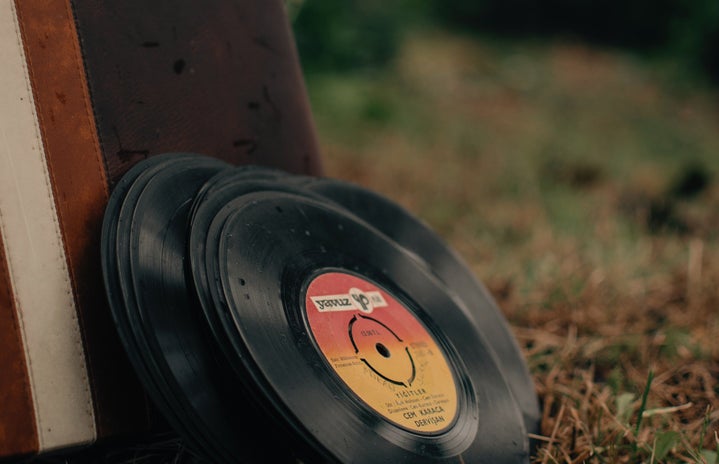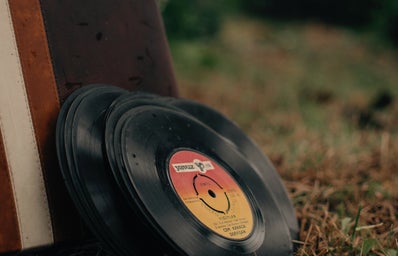Why is it that fashion trends always seem to come back around in time? Why do people enjoy collecting objects from the past? Stamps, books, hats, wallets, watches…all these everyday material things from the past are valued as treasures to the right eye. I think it’s fascinating that we attribute worth to old things. For this reason, within this article, I try to unpack why we are so drawn to vintage, and share some wonderfully specific examples from my friends and family of what trinkets they like collecting, and what they hope someone collects from them in the future.
I think our fascination with vintage objects lies in that obtaining something preloved makes us feel a connection to people from the past; objects and clothes that used to belong to someone else automatically feel more valuable. Through re-wearing or reusing them, we gain an unspoken connection with a stranger which we otherwise would never have had, building an invisible connection between timelines. Many people not only go to second hand shops for cheaper prices, but also because they want to reclaim and relove items that have previously had another owner. In my mind, there’s a conscious acknowledgment of the object having a soul, in the sense that it has belonged to someone else. If I was to buy an old 1920s beautifully hand crafted lamp from a vintage shop, I would think ‘don’t worry lamp, I’ll put you to good use again’, which I suppose is really an acknowledgment of the human labour and craftsmanship that went into its creation, and how it deserves to still be appreciated (as well as an insight into my slightly loopy inner monologue).
Is it not within our human nature to be drawn to that which we don’t know and cannot see? I think this is partly the reason we have such a hankering for old things – it connects us to worlds that we did not experience. It’s in learning about the history of an object that it gains even more value, either monetary or purely sentimental. For example, I have a collection of old books, my oldest one being a copy of Milton’s Paradise Lost from 1857, and on the front page of a large majority of these books are little notes to the owner from the person who bought it for them with their signature and date. My heart absolutely leaps for joy when I find these, it launches me into a world I have only imagined and paints it as real. Living in the knowledge that I am now part of these books’ history of owners and that my mark will be left in all of my books too, old and new, makes me feel that I have some sort of impact on the world. Perhaps that is also a key factor for why we are so drawn to vintage, it makes our mortal lives feel that bit more important, knowing that our objects will outlive us and someone might find and love them again…
I asked my friends and family to share their own obsession with vintage, and why they enjoy collecting and finding it. A lot of people share a fascination with old books, clothes, accessories, music, and jewellery. Some other things people liked to collect were things like plates and bowls, postcards, letter openers, tiny pots, maps, figurines, buttons and cars. How incredibly wonderful is it that we still appreciate all these small things (in most cases) in this world that is so high in consumerism? This is a key part to a lot of these people’s interests too; many said that they loved collecting these old things due to the quality of the craftsmanship that they had in the early 20th century. Objects were often made by hand and therefore each individual piece is unique and of a much higher quality than the mass produced things we have now. Many people also shared a consciousness that buying second hand is far better for the environment, and that it is a sustainable and easy thing to do, helping to contribute to the betterment of our world.
I want to share some thoughts directly from what my friends said…
As mentioned before, old things make us feel a connection to the past. My friends, certainly, felt that in having old objects “you feel as though they have a story, as if they keep secrets”.
“It’s[…]the excitement of finding them [vintage objects], in older family members’ belongings or in charity or vintage shops[..].rather than the object itself”.
“You can’t get them anymore, so you end up with a unique item no one else has”.
“I like the smell and feel of old books”.
“A lot of old things are from my family, so it’s more a sentimental thing to keep family members who died in good memory”.
“I also enjoy the history associated with these objects in a similar way I can appreciate historic buildings”.
“It’s a remnant of the past; a reminder of how things used to be. Better quality, already used/worn in, pondering its past life. I like propaganda posters (20th century) because of its art style and history”.
“It’s fascinating how people decades before me found the same things beautiful. It’s how I know that beauty really can outlast generations. I also like to imagine what the objects’ previous lives were like, especially with books, I wonder what the previous reader felt and thought”.
When asked what belongings from their own shelves they would hope people would collect, lots of people said things like books, letters, poetry, and old diaries. This screams to me that, within our human nature, we wish to keep ourselves alive even after death; all these things, particularly written things, create a link to our existence which future people can look back on and wonder about. Isn’t it beautiful that we have it in our capacity to spark curiosity just by leaving behind our creations, collections and things that we poured love into?
I recently paid a visit to my favourite second-hand book shop where I found an old artist’s sketchbook. In it, there were many different drawings all signed and dated by different people from different years. I also found passages of poetry, both copied from a famous work and original work. I want to share with you two verses that a woman called Laura Sharpe wrote down in October 1920 from the poet Ella Wheeler Wilcox’s poem ‘Never Mind’:
“Whatever your work, and whatever it’s worth,
No matter how strong or clever,
Someone will sneer if you pause to hear,
And scoff at your best endeavour.
For the target art has a broad expanse,
And wherever you choose to hit it,
Though close be your aim to the bull’s eye frame,
There are those who will never admit it.
So work along in your chosen niche
With a steady purpose to nerve you;
Let nothing men say who pass your way
Relax your courage or swerve you.
The idle will flock by the Temple of Art
For just the pleasure of gaging;
But climb to the top, and do not stop,
Though they may not all be praising.”
It’s enthralling to me that this woman, Laura Sharpe, clearly felt a particular affinity to this poem and wanted to write it down. She felt emotion as we do now and shared the experience of anxiety around success and courage that we still feel to this day. Through her simple act of noting this poem down, she has created a tie with future readers of the sketchbook and crossed the bridge of generations to speak directly to me (or whoever else stumbles across the sketchbook).
I propose, then, that our enchantment with collecting old things – vintage items, pre-loved, pre-worn, remade, reused and recycled objects – comes from the stories of human life that they tell; the human connections that they imply, the creativity and curiosity they inspire and hope. Hope that one day the evidence of our lives will be rediscovered and appreciated; hope that there is an escape from the consumerist, capitalist world we live in, and a hope that young people can share an organic interest in beauty, minute details, and evoke in ourselves a desire to create things of quality and meaning, both for us and the people around us.


